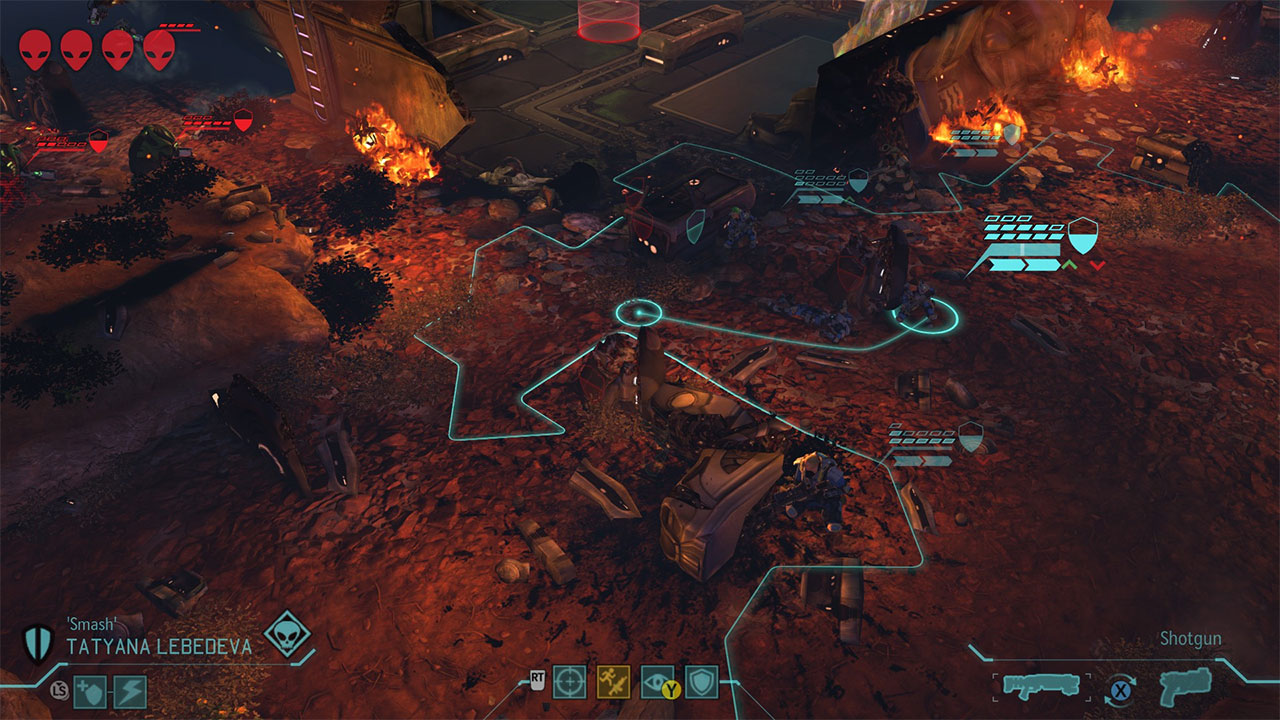This article is part of our special series on Mental Health and Gaming, and was supported by community funding. If you want to help support future feature articles and special series, please consider donating to our Patreon.
It’s been a long day at work. You’ve just come home from a grueling commute, an incoming deadline, and a particularly rough meeting for the week ahead. On any other day, you’d be able to handle the stress. But on the way home from work, you started to panic. It came in short waves, just from the back of your neck. But then your hands grew numb, your stomach queasy. Your chest tightened as your breathing grew short.
At last, you reached home. You felt like you could barely make it. Now that you’re away from work, you know that you need to calm down, just to put the day behind you. So the first thing you do after you step inside is take off your shoes, lay down on the couch, and turn on your Wii U to play a round of Turf War on Splatoon.
Suddenly, the ride home seems to melt away. The week ahead feels manageable now that you’re covering the map in ink.
Sounds familiar, no? Videogames provide an escape from the stresses of everyday life. That isn’t necessarily a bad thing, either. Like most hobbies, gaming is a skill that is acquired over time. Players put their time into games they care about, with the hope that they’ll advance and earn in-game success. Not to mention, in-game conflicts have very little bearing on the real world, so gaming provides an enclosed space for players to sit back and relax.
But, it can be difficult to forget about the outside world when dealing with depression, anxiety, and other mood disorders. Even when you’re playing Splatoon, stress seems to just creep back in no matter what. So, can videogames help these players cope with their mental illnesses? Do videogames let players better understand and process information? Are there any psychological benefits to playing videogames?

A battle scene from Luftrausers
Coping with the Design
Arguably, yes. Gaming relies on the player’s ability to make decisions and respond to in-game events, and most games are advanced by resolving conflicts. So players that spend a lot of time playing a specific videogame have a better chance of understanding the game’s mechanics, and solving in-game challenges. In turn, this lets players learn problem-solving skills that can be applied back to everyday life.
Granted, each game comes with its own skillset — and some games are harder to learn than others. For instance, newcomers to Vlambeer’s aerial shoot-’em-up Luftrausers simply have to learn how to dodge incoming fire and score combo kills, whereas Relic Entertainment’s World War II strategy game Company of Heroes 2 forces players to spend hours at a time learning team builds, unit placement, and strategic chokepoints on the in-game map.
That said, players naturally solve challenges faster as they become more familiar with a game’s mechanics. Advanced Company of Heroes players can multitask unit placement across the battlefield. Luftrausers fans can differentiate enemy fire based on bullet patterns. Experienced players know a game’s mechanics so well that they can quickly pinpoint conflicts and execute a solution. In other words, players that spend time learning from their in-game failures become better problem-solvers.
But do these skills translate into everyday life? One 2013 review from the American Psychological Association found that strategy videogames enhanced problem-solving skills in young children, and had the potential to increase “emotional resilience” in daily life. In-game failures aren’t a dead end for children, the report argues; rather, when presented with a conflict, young players create coping mechanisms that help them advance through the game.
In real life, investing energy into everyday life can be an overwhelming experience for gamers with mood disorders. The sheer abundance of negative thoughts and feelings from depression can make the outside world feel too complex to handle. However, videogames are designed with a solution in mind for the player to achieve. They present an interactive space for the player to overcome conflicts without any real world consequences for failing. In gaming, we tend to believe, there’s no such thing as a permanent loss — just restarting.
Approaching XCOM
As a gamer myself, I was curious how other players thought about in-game mechanics. So I decided to reach out to Charlotte Park, a good friend of mine and fellow gamer.
Firaxis’s XCOM: Enemy Unknown is a favorite of Park’s. Not unlike its predecessor XCOM: UFO Defense in the 1990s, the 2012 reboot of the classic turn-based strategy series is extremely difficult. Players must fight off an alien invasion while maintaining the interests of the XCOM initiative’s member nations, who also control the project’s funding. Most newcomers struggle through the Classic difficulty option, as member nations gradually drop out of the game.
Park was a fan of the original XCOM series from the 1990s. On a friend’s suggestion, she decided to give the remake a try on Classic. But she quickly bumped the difficulty level down.
“I needed to switch to Normal just to get a feel for everything with how brutal XCOM can be,” she said. “Eventually I managed to work my way up to Impossible, though I find myself having difficulty slogging through the campaign again at that level of difficulty — because, y’know, your guys die. A lot.”
Park brings up an interesting point: XCOM also lets players choose Easy or Normal difficulty options for a much more manageable experience. In most situations, in-game risk has been diminished to the point where players simply have to use cover and prioritize enemy targets in order to win missions. So as the player learns the game’s mechanics at their own pace, they can also become more confident in their abilities to succeed, and subsequently move onto the harder difficulty levels. This is particularly important for players with depression or anxiety, who might have a low threshold for in-game challenge. Afterwards, they can take on the harder difficulty levels.
Likewise, Park understands why players would remain at the easier difficulty levels, and agrees there’s a stigma around them. While she admits that she’s ambivalent about the issue, she also doesn’t mind casual gaming.
“Not everyone has the time or energy to dedicate to ‘git gud’, not every game really needs to be Dark Souls level of hard,” she told me.
“There’s nothing wrong with being a casual player, there’s nothing wrong with just wanting to pick up a game and have fun. Escapism is a nice thing sometimes.”

In SPARX, you fight gloom, overcome problems, and engage in other therapeutic game activities [source: SPARX trailer]
Science Behind the Escape
Of course, escapism doesn’t inherently help at-risk players overcome their mental illnesses. Nor does self-confidence. In most cases, behavioral and cognitive therapy are necessary for improving mental health. However, scientific studies show that the skills players learn during play introduce cognitive benefits in everyday life. In other words, games teach players how to better understand their surroundings.
Take one article review published in the American Journal of Play, “Video Games: Play That Can Do Serious Good.” According to the authors, action, puzzle, and strategy videogames enhanced logical and visual information processing capabilities for their players. Extended time playing the strategy game Rise of Nations, for instance, improved “task switching, working memory, and abstract reasoning” among individuals suffering from age-related cognitive declines. Likewise, action and puzzle videogames improved players’ ability to prioritize decisions and quickly switch between tasks. Alongside cognitive therapy, videogames help the brain operate more efficiently while observing and understanding information.
Hard data also shows that videogames can improve cognitive functioning, diminish the effects of depression and anxiety disorders, and can even be designed for therapeutic purposes. According to TIME, the cognitive behavioral therapy videogame SPARX successfully helped 44% of players completely overcome their depression, with 66% experiencing decreased depression symptoms after playing the game. Likewise, in a recent study at Michigan State University, researchers found that their shape-identification videogame “improved concentration and lessened anxiety for the anxious participants [who played the game].” Associate professor of psychology Dr. Jason Moser even concluded there was a potential to open a new market specifically for videogame therapy.
But I was still curious how these studies stacked up to everyday life. So I decided to interview Grace Kroll, a fellow gamer and friend of mine who suffers from depression and anxiety in her life. She told me that she prefers playing videogames that are easy to slip into and make progress.
“As someone who has depression and anxiety, games like Animal Crossing help me tune in and motivate myself to try to feel a little better while building something that matters to me,” she said. “Even if I am building a better fictional town, or advancing my level in a game, it serves as a small relief to me, a short-term reminder that I am capable of doing something successfully while I wait for a larger, long-term sign of success in my life’s endeavors.”
Kroll makes an excellent point. Not just can games help fight mental illnesses, but they can also change the ways players think about everyday life. Escapism ends up being therapeutic.
“Some of my favorite games to play are those that don’t pressure me into playing heavily… I like to feel absorbed but lost, confused in searching and finding and learning, but also aware and interested enough to find out more,” she said. “I like games to be a learning experience about the setting.”
Balancing Out
Scientific research alone shows that recreational gaming can help players improve their mental functioning, and deal with mood disorders. However, while there are certainly psychological benefits from regularly playing games, relying too heavily on gaming for personal happiness can prevent any meaningful psychological changes for players suffering from mental illnesses. In fact, self-medicating with videogames can increase a player’s risk for developing an addiction.
Earlier this year, VICE’s exposé on videogame addictions explored the darker side of escapism in gaming. In the article, journalist Cecilia D’Anastasio discussed several gaming addicts who avoided dealing with their day-to-day responsibilities by spending dozens of hours playing videogames. One addict, a young man named Brett, refused to shower for six days in order to play over 100 games. Another player, a 69-year old named Patricia, refused to spend time with her husband and family in order to play World of Warcraft. While these addictions are explicitly psychological in nature, D’Anastasio found that videogame addictions are notoriously hard to overcome — in some cases, they can even mirror “intense withdrawal symptoms similar to those of cocaine: sleeplessness, anxiety, and hallucinations.”
How could videogames cause this kind of severe reliance from their players? The American Journal of Play notes that videogames release “the same chemicals the brain releases when a hungry or thirsty person receives food or water, as well as when someone takes one of the many commonly abused drugs,” concluding that dopamine levels activated in the brain during play “[resemble] that related to some recreational drug use.” But this isn’t necessarily true. As psychotherapist Mike Langlois points out on his website “Gamer Therapist,” reward-based chemical reactions in the brain do not inherently create addictions to food or water in humans, nor are they entirely responsible for addictions in gaming. Rather, there are other reasons for the addictions that D’Anastasio discovered.

The Azsuna area from World of Warcraft’s latest expansion [source].
In 2009, psychology professor Dr. Zaheer Hussain collected self-reported data on time spent gaming among massively multiplayer online role-playing game (or, MMORPG) players. Hussain found MMORPGs had the ability to modify players’ moods, create tolerance to in-game rewards, and promote a relapse among returning players. He concluded that these traits “may be indicative of a tendency for some gamers to use online gaming as a mood modifier,” concluding that some users “may also engage in online gaming as a means of coping with problems in their everyday lives.”
Dr. Hussain’s findings were further supported by a 2013 research study done at University of Missouri on videogame addictions. According to Department of Psychological Sciences doctoral candidate Joe Hilgard, escapism was the “biggest risk factor for pathological videogame use” among gamers.
“Individuals who play games to get away from their lives or to pretend to be other people seem to be those most at-risk for becoming part of a vicious cycle,” Hilgard explains. “These gamers avoid their problems by playing games, which in turn interferes with their lives because they’re so busy playing games.”
Not unlike alcoholism or workaholism, games can become a misguided solution to stifle sadness, loneliness, insecurity, and rumination. For players already suffering from pre-existing mental illnesses, this can be especially damaging. By repressing their anxiety or depression, addicts reject therapy in exchange for play. This prevents players from understanding their mental illnesses, leading to a self-destructive dead end.
When I talked to Park and Kroll, they both seemed to agree.
“Aside from games based on the Skinner box model — gambling games and the like — I don’t find that games have any inherently addictive mechanics within them,” Park said. “It’s like any other hobby — some people have difficulty doing things in moderation and they let it consume them, but it has much more to do with individual personalities than game design as far as I can tell.”
Meanwhile, Kroll stressed how addictions stem from the individual. “Addiction can be anything to someone,” she said. “Some people can get addicted to anything, simply because that’s the way they’re genetically wired.”
“My grandfather died of alcoholism, and my father struggled with many forms of addiction. Luckily, I’ve never experienced this. I think it’s a matter of knowing how to balance your life.”
Perhaps Kroll is right — in the end, gaming is all about moderation. Without confronting their addiction, videogame addicts are stuck in a cycle, never able to fully overcome the painful emotions and feelings lying underneath their time spent in-game.
Escapism isn’t inherently a bad part of videogaming. Just as readers love to escape the real world through books, gamers play videogames in order to shed the daily stresses of everyday life. There’s nothing wrong with putting a large amount of time into gaming — in fact, psychologists agree that videogames provide substantial benefits to everyday life, and can improve the cognitive capabilities of their players. It’s certainly a great hobby for relaxing after a long day.
However, videogames are not a saving grace from mental illnesses. Overuse presents real barriers for behavioral therapy, and relying on a videogame for personal happiness can develop addictive habits in players. Without healthy boundaries and proper health care, mental illnesses can fester under gaming addictions.
Granted, that’s not to say that gamers should not be allowed to escape into their favorite worlds. Everyone needs to let go of daily life now and then. But even escapism must be done in moderation. After all, there’s a fine line between using videogames to relax, and using games to run away from solving problems. Without any serious therapy for ongoing mental illnesses, no videogame can help a player overcome their everyday struggles.


